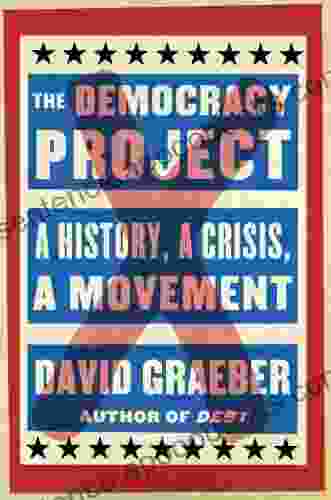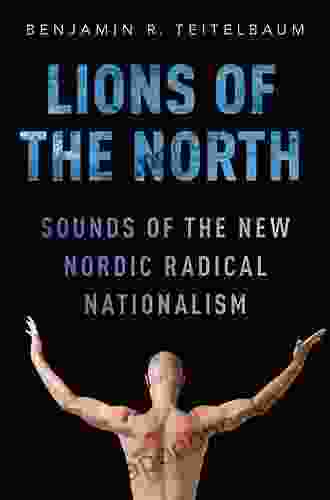Unveiling the Secrets of the History Crisis Movement: A Comprehensive Guide

4.5 out of 5
| Language | : | English |
| File size | : | 1333 KB |
| Text-to-Speech | : | Enabled |
| Screen Reader | : | Supported |
| Enhanced typesetting | : | Enabled |
| Word Wise | : | Enabled |
| Print length | : | 356 pages |
In the realm of historical inquiry, the History Crisis Movement stands as a provocative and enigmatic force. This article delves into the profound depths of this movement, unraveling its intricate origins, evolution, and far-reaching impact on our understanding of the past. Through a comprehensive exploration of its key tenets, motivations, and consequences, we aim to shed light on the hidden truths behind this fascinating phenomenon.
The Origins of the History Crisis Movement
The seeds of the History Crisis Movement were sown in the fertile ground of the late 20th century. A growing disillusionment with traditional historical narratives, coupled with the rise of postmodernist and revisionist theories, laid the foundation for this intellectual upheaval. Historians began to question the objectivity and authority of established historical accounts, recognizing the inherent biases and limitations that shape our understanding of the past.
This skepticism extended to the very foundations of historical methodology. Traditional approaches, which emphasized the accumulation of facts and the construction of objective narratives, came under fire. Critics argued that all historical interpretations are inherently subjective and that the pursuit of a single, definitive truth is an elusive illusion.
Key Tenets of the Movement
At its core, the History Crisis Movement is characterized by several key tenets that challenge the conventional wisdom of historical inquiry:
- The rejection of objectivity: History Crisis Movement scholars argue that historical narratives are not objective accounts of the past but rather subjective interpretations shaped by the biases, perspectives, and ideologies of the historians who construct them.
- The emphasis on narrative: The movement places a strong emphasis on the role of narrative in shaping our understanding of history. Historians are seen as storytellers who weave together evidence to create compelling and persuasive narratives that may not necessarily reflect the complexities of the past.
- The questioning of historical truth: History Crisis Movement scholars reject the notion of a single, definitive historical truth. They argue that all historical interpretations are provisional and subject to revision as new evidence emerges or as our understanding of the past evolves.
- The embrace of pluralism: The movement advocates for a more inclusive and diverse approach to historical inquiry. It encourages historians to consider multiple perspectives and to challenge established narratives that have marginalized certain groups or silenced their voices.
Motivations Behind the Movement
The History Crisis Movement emerged in response to a number of factors that had a profound impact on the field of history:
- The Vietnam War and the Civil Rights Movement: The social and political upheavals of the 1960s and 1970s led many historians to question the objectivity and neutrality of traditional historical narratives. They argued that these narratives often served to justify the status quo and perpetuate systemic injustices.
- The rise of postmodernism: Postmodernist theories, which emphasized the deconstruction of traditional narratives and the fluidity of meaning, had a significant influence on the History Crisis Movement. Postmodernist thinkers argued that all knowledge, including historical knowledge, is socially constructed and subject to constant revision.
- The impact of new technologies: The advent of new technologies, such as digital archives and social media, has made it easier for historians to access and share a wider range of historical sources. This has led to a proliferation of new historical perspectives and a challenge to established historical narratives.
Consequences of the Movement
The History Crisis Movement has had a profound impact on the field of history. It has led to a more critical and self-reflexive approach to historical inquiry, as well as a greater awareness of the biases and limitations that shape our understanding of the past. Some of the key consequences of the movement include:
- A shift towards more diverse and inclusive historical narratives: The movement has encouraged historians to consider multiple perspectives and to give voice to marginalized groups that have been historically silenced or misrepresented.
- A greater emphasis on historical interpretation: Historians now recognize that all historical accounts are interpretations and that there is no single, definitive truth. This has led to a more nuanced and complex understanding of the past.
- A challenge to traditional historical authority: The movement has undermined the notion that historians are the sole arbiters of historical truth. It has encouraged a more democratic and participatory approach to historical inquiry.
- A renewed interest in historical methodology: The movement has sparked a renewed interest in the methods and practices of historical inquiry. Historians are now more aware of the ways in which their own biases and perspectives can influence their work.
Criticisms of the Movement
While the History Crisis Movement has made significant contributions to the field of history, it has also been met with some criticism. Some critics argue that the movement has gone too far in its rejection of objectivity and that it has led to a relativism that undermines the possibility of historical knowledge. Others contend that the movement has become too focused on theory and that it has neglected the importance of empirical research. Despite these criticisms, the History Crisis Movement remains a vital and influential force in contemporary historical inquiry.
The History Crisis Movement is a complex and multifaceted phenomenon that has had a profound impact on the field of history. Its origins lie in the disillusionment with traditional historical narratives and the rise of postmodernist theories. The movement's key tenets include the rejection of objectivity, the emphasis on narrative, the questioning of historical truth, and the embrace of pluralism. The movement has been motivated by a number of factors, including the Vietnam War and the Civil Rights Movement, the rise of postmodernism, and the impact of new technologies.
The History Crisis Movement has had both positive and negative consequences. It has led to a more critical and self-reflexive approach to historical inquiry, as well as a greater awareness of the biases and limitations that shape our understanding of the past. However, it has also been criticized for its rejection of objectivity and its emphasis on theory over empirical research. Despite these criticisms, the History Crisis Movement remains a vital and influential force in contemporary historical inquiry.
As we move forward, it is important to engage in a thoughtful and nuanced discussion about the implications of the History Crisis Movement. By acknowledging its strengths and weaknesses, we can harness its potential to contribute to a more just and equitable understanding of the past.
Additional Resources:
- The History Crisis Movement: A Review of the Literature
- The Crisis of History
- The Historian's Craft
4.5 out of 5
| Language | : | English |
| File size | : | 1333 KB |
| Text-to-Speech | : | Enabled |
| Screen Reader | : | Supported |
| Enhanced typesetting | : | Enabled |
| Word Wise | : | Enabled |
| Print length | : | 356 pages |
Do you want to contribute by writing guest posts on this blog?
Please contact us and send us a resume of previous articles that you have written.
 Book
Book Novel
Novel Page
Page Chapter
Chapter Text
Text Story
Story Genre
Genre Reader
Reader Library
Library Paperback
Paperback E-book
E-book Magazine
Magazine Newspaper
Newspaper Paragraph
Paragraph Sentence
Sentence Bookmark
Bookmark Shelf
Shelf Glossary
Glossary Bibliography
Bibliography Foreword
Foreword Preface
Preface Synopsis
Synopsis Annotation
Annotation Footnote
Footnote Manuscript
Manuscript Scroll
Scroll Codex
Codex Tome
Tome Bestseller
Bestseller Classics
Classics Library card
Library card Narrative
Narrative Biography
Biography Autobiography
Autobiography Memoir
Memoir Reference
Reference Encyclopedia
Encyclopedia Brett Lunceford
Brett Lunceford Marc William Palen
Marc William Palen Don Nardo
Don Nardo Yancy Caruthers
Yancy Caruthers Elias M Stein
Elias M Stein Alan Edward Nourse
Alan Edward Nourse Dean Thomas
Dean Thomas Melissa Rodriguez
Melissa Rodriguez Erica Hogan
Erica Hogan Jeffrey W Taliaferro
Jeffrey W Taliaferro Teri Barnett
Teri Barnett Ellen Mitten
Ellen Mitten Emily Shaw
Emily Shaw Elizabeth Bromke
Elizabeth Bromke Elizabeth Greenwood
Elizabeth Greenwood Theresa Beachman
Theresa Beachman Merry Farmer
Merry Farmer Stuart Elden
Stuart Elden Emily Juniper
Emily Juniper Ellen Weber Libby
Ellen Weber Libby
Light bulbAdvertise smarter! Our strategic ad space ensures maximum exposure. Reserve your spot today!

 Alexandre DumasUnveiling the Secrets of Tarantula Care: A Comprehensive Guide for Beginners...
Alexandre DumasUnveiling the Secrets of Tarantula Care: A Comprehensive Guide for Beginners... Shane BlairFollow ·14.7k
Shane BlairFollow ·14.7k Craig BlairFollow ·4.1k
Craig BlairFollow ·4.1k E.M. ForsterFollow ·10.3k
E.M. ForsterFollow ·10.3k Isaac MitchellFollow ·19.6k
Isaac MitchellFollow ·19.6k Rod WardFollow ·12.8k
Rod WardFollow ·12.8k Adam HayesFollow ·5.5k
Adam HayesFollow ·5.5k Michael CrichtonFollow ·19.8k
Michael CrichtonFollow ·19.8k Felipe BlairFollow ·16.4k
Felipe BlairFollow ·16.4k

 Julian Powell
Julian PowellShetland Pony: Comprehensive Coverage of All Aspects of...
The Shetland...

 Cason Cox
Cason CoxHow Anaesthetics Changed the World: A Medical Revolution...
Imagine a world where surgery is an...

 Harold Powell
Harold PowellUnleash Your Inner Songwriter: The Ultimate Guide for...
Calling all aspiring songwriters!...

 Nikolai Gogol
Nikolai GogolUnleash Your Artistic Potential: Quick Draw Anatomy for...
In the dynamic and visually...

 Tim Reed
Tim ReedThe Rock 'n' Roll Life of Legendary Sax Man Bobby Keys
The Rock 'n' Roll Life...

 Damon Hayes
Damon HayesMoney Management Activities for Youth: A Guide to...
In an era marked by rapidly...
4.5 out of 5
| Language | : | English |
| File size | : | 1333 KB |
| Text-to-Speech | : | Enabled |
| Screen Reader | : | Supported |
| Enhanced typesetting | : | Enabled |
| Word Wise | : | Enabled |
| Print length | : | 356 pages |










